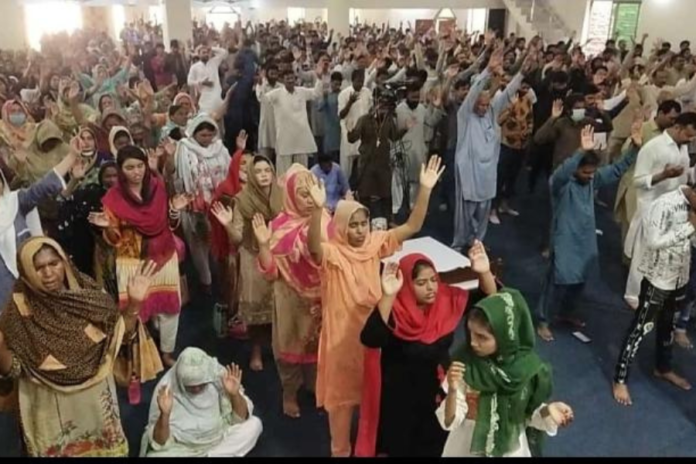When a vigilante mob attacked their home in a Christian neighbourhood of Punjab province in eastern Pakistan, Kanwal, 18, and her newborn son Samuel had just arrived from the hospital.
Her family narrowly escaped the mob that set their home on fire last week, taking their pet birds and all of their possessions with it. Terrified, she grabbed the infant and ran barefoot with the rest of her family.
“We are very scared of our neighbours … we don’t want them to destroy whatever little we have left,” said Kanwal, cradling Samuel as she sat in a school classroom converted into a makeshift dormitory in the bustling market town of Jaranwala.
“We should be shifted somewhere else,” she added. Her 11-year-old brother and sisters aged seven and 11 are too scared to return to school, where they are among a tiny minority of Christian students.
“Today was the first day of school after summer vacations but I did not send them because of fear,” said their mother, Kiran. “I told them, ‘You will get an education if you stay alive.'”
On Wednesday, a mob allegedly wielding iron rods, knives, and sticks went on an hours-long rampage in which they set fire to numerous homes and churches. Nearly 160 people have been detained in connection with the incident.
Police and locals said that the Islamist attack began when someone presented a mosque prayer leader with allegedly desecrated portions of the Muslim holy book, the Koran, and pronouncements demanding retribution.
Two Christian men are being held by police on blasphemy charges while they conduct an investigation.
Although blasphemy in Pakistan is punishable by death, no one has ever been put to death for the crime, despite the fact that countless people have been murdered by angry mobs in the past.
In an effort to change the blasphemy law, a former regional governor and a minister for minorities were shot and killed.
With farms producing wheat, rice, and sugarcane, Jaranwala is located in the rural heartland of Pakistan’s Punjab province. A sizable detachment of armed paramilitary soldiers has dispersed to settle things down.
Less than 2% of Pakistan’s 241 million people are Christian, and many of them live in poverty. Provincial and federal officials have promised financial assistance to the Christian minority to help them improve their lives.
Anwaar-ul-Haq Kakar, the acting prime minister, paid a visit to the region on Monday. He announced aid for the harmed families, referred to the incident as an atrocity, and assured Pakistan’s minority religious communities that the government would safeguard them.
The pain and terror, however, will be difficult to repair, according to community members and advocates, and their safety is not guaranteed. Many people are terrified to go back home but are also unsure of where to start over because they are still in shock.
“Everyone is focusing on giving them food, giving them shelter, but what they are feeling, how they are broken from the inside, how they will accept that they are equal citizens, this is the (important) thing,” said Naseem Anthony, a member of a rights group, Awam.
“There is very serious concern from the civil society side about the psychological damage,” added Anthony, speaking outside a gathering of civil society organisations held near a salmon-pink church, its insides blackened with soot.
Along with Kanwal’s family, roughly 240 people reside in the temporary shelter in the school a few streets away.
With the midst of classroom walls still covered with charts teaching the alphabet and how to count, string and wood cots have been erected.
Many people in this area lived outside, in fields and on highways, in the hot days immediately following the attack.
When they thought back on Wednesday’s events, they spoke of experiencing depressive and anxious sensations, a fear of wide open places, difficulty sleeping, and frequent fits of crying.
“Most of the people from the Christian colony in Jaranwala are afraid of returning home because of the unrest and uncertainty about their protections,” said community leader Akmal Bhatti.
“All this is triggering a sense of fear,” he added. “The majority of children are suffering psychological issues … Now, children and girls are afraid of people, they don’t want to go out in markets and crowded places.”
Government representatives said they would allow individuals to stay at the closely guarded shelter for as long as necessary and added that it was manned with doctors and nurses to provide support.
According to non-government organisations, hundreds of individuals have physically been relocated, and the violence has affected thousands of Christians in the region. Some are staying with relatives, while others are in neighbouring temporary shelters.
Kiran, Kanwal’s mother, and Kanwal are unsure of how long the family will be staying.
“My greatest wish now is that I want security,” said Kiran. “I want a safe place for my family to live in. The fear that has got embedded in my heart and my children’s minds is just not going away.”



